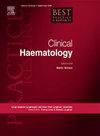恶性血液病肿瘤疫苗:临床使用的合理性和证据的系统回顾
IF 2
4区 医学
Q3 HEMATOLOGY
引用次数: 0
摘要
免疫疗法,包括免疫检查点阻断、CART细胞和双特异性抗体,已经显著改善了血液学恶性肿瘤患者的预后,证明了免疫系统在靶向恶性细胞方面的独特效力。癌症疫苗的开发旨在唤起激活的效应细胞群和记忆反应,以提供长期的免疫监测,以防止复发。开发一种有效的癌症疫苗依赖于确定适当的抗原靶点、增强抗原呈递和克服微环境的免疫抑制环境。关键的进展包括鉴定作为高亲和力T细胞靶点的新抗原,通过全细胞或多肽平台的多抗原靶点,基于树突状细胞的策略,以及辅助免疫调节剂来增强应答。在本综述中,我们研究了目前对恶性血液病免疫失调的理解,癌症疫苗的基本原理,以及临床前和临床环境中可获得的临床和免疫应答数据。本文章由计算机程序翻译,如有差异,请以英文原文为准。
Cancer vaccines in hematologic malignancy: A systematic review of the rational and evidence for clinical use
Immunotherapy, including immune checkpoint blockade, CART cells and bispecific antibodies have resulted in dramatic improvements in outcomes for patients with hematological malignancies, demonstrating the unique potency of the immune system in targeting malignant cells. The development of cancer vaccines aims to evoke an activated effector cell population and a memory response to provide long term immune surveillance to protect from relapse. Developing a potent cancer vaccine relies on identifying appropriate antigen targets, enhancing antigen presentation, and overcoming the immune suppressive milieu of the micro-environment. Critical advances include the identification of neoantigens as targets for high affinity T cells, multi-antigenic targets via whole-cell or multi-peptide platforms, dendritic cell-based strategies, and adjunct immunoregulatory agents to enhance response. In the present review, we examine the current understanding of immune dysregulation in hematologic malignancies, the rationale for cancer vaccines, and the clinical and immunologic response data available from preclinical and clinical settings.
求助全文
通过发布文献求助,成功后即可免费获取论文全文。
去求助
来源期刊
CiteScore
4.20
自引率
0.00%
发文量
42
审稿时长
35 days
期刊介绍:
Best Practice & Research Clinical Haematology publishes review articles integrating the results from the latest original research articles into practical, evidence-based review articles. These articles seek to address the key clinical issues of diagnosis, treatment and patient management. Each issue follows a problem-orientated approach which focuses on the key questions to be addressed, clearly defining what is known and not known, covering the spectrum of clinical and laboratory haematological practice and research. Although most reviews are invited, the Editor welcomes suggestions from potential authors.

 求助内容:
求助内容: 应助结果提醒方式:
应助结果提醒方式:


